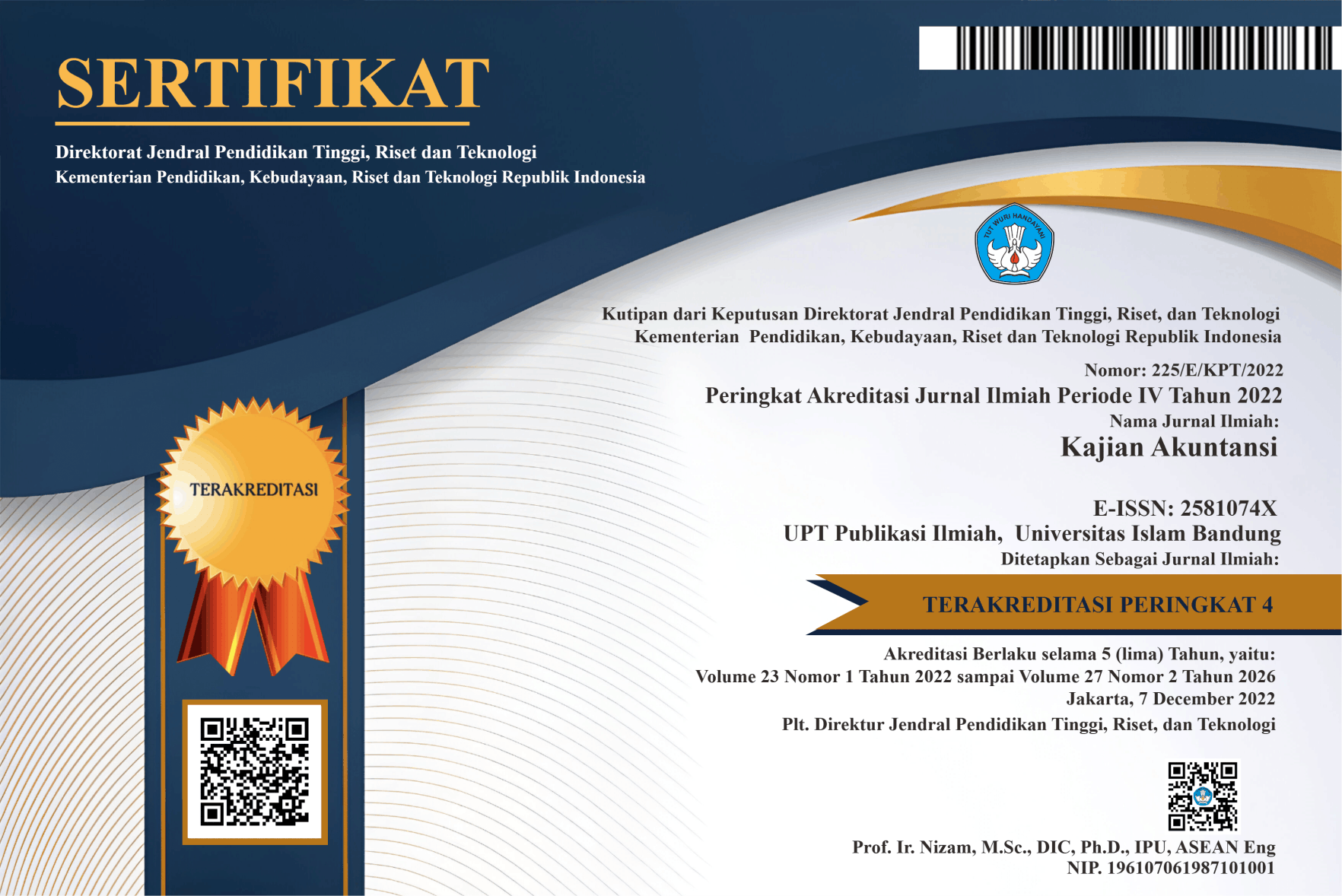THE CONTRIBUTION OF CERTIFIED FRAUD EXAMINER (CFE) IN RISK MANAGEMENT OF THE BANKING INDUSTRY IN INDONESIA
DOI:
https://doi.org/10.29313/kajian_akuntansi.v25i2.3681Keywords:
Banking Industry, Certified Fraud Examiner, Fraud Prevention, Hexagon Fraud, Risk ManagementAbstract
This research discusses the role of the Certified Fraud Examiner (CFE) in banking risk management in Indonesia. Using the literature study method, data regarding the adoption of contributions in preventing and detecting fraud were collected. The analysis results show that CFE has an important role in enterprise risk management, especially in fraud detection and fraud prevention. The Hexagon Fraud Theory, which elaborates on six factors that drive people to commit fraud, is analyzed in depth by considering the risk aspects that exist in the banking industry. This research proposes increasing the involvement of CFE-certified professionals in banking teams, as well as the need for collaborative research to evaluate the impact of CFE certification in more depth. It is recommended that banking companies continue to improve compliance with rules and regulations and build a corporate culture that supports effective risk management.
Keywords : Banking Industry, Certified Fraud Examiner, Fraud Prevention, Hexagon Fraud, Risk Management.
References
Association of Certified Fraud Examiners (ACFE). 2024. Occupational Fraud 2024: A Report to the Nations.
Andriyani, M., & Tanjung, H. (2018). Analisis Manajemen Risiko Dalam Mengatasi Pembiayaan Bermasalah Pada Kredit Pemilikan Rumah (KPR)(Studi Kasus BRI Syariah Cabang Bogor). Al- Infaq: Jurnal Ekonomi Islam, 6(2), 217–261.
Ariyanto, R. (2019). Analisis Komparatif Sertifikasi Auditor Certified Fraud Examiner (CFE) Dan Certified Forensic Auditor (CFrA). Accounting and Business Information Systems Journal, 7(4).
Aysan, Ahmet Faruk, Bekir Sait Ciftler, & Ibrahim Musa Unal. (2024). Predictive Power of Random Forests in Analyzing Risk Management in Islamic Banking. Journal of Risk and Financial Management, 17–104.
Barnes, J. (2020). Fraud Detection: Forensic Accounting Education and CFE Designation Impact on Auditor’s Confidence Levels. Journal of Accounting and Finance, 20(4).
Fasa, M. I. (2016). MANAJEMEN RESIKO PERBANKAN SYARIAH DI INDONESIA. Jurnal Studi
Ekonomi Dan Bisnis Islam, 1(2), 36–53.
Febriyanti, D., & Syarif, D. (2023). Efektifitas peran akuntan forensik dalam mengatasi fraud: analisis fraud pentagon theory. Inovasi: Jurnal Ekonomi, Keuangan, Dan Manajemen, 19(4), 965–975.
Grebe, G. P. M., & Marx, J. (2023). The Perceived Relationship between Risk Culture and Operational Risk Management Practices of Ghanaian Banks. Journal of Risk and Financial Management, 16(9), 407. https://doi.org/10.3390/jrfm16090407
Jadwani, B., Parkhi, S., & Mitra, P. K. (2024). Operational Risk Management in Banks: A Bibliometric Analysis and Opportunities for Future Research. Journal of Risk and Financial Management, 17(3), 95. https://doi.org/10.3390/jrfm17030095
Khoirunnisa, & Aristi, M. D. (2023). IMPLEMENTATION OF RISK MANAGEMENT AS AN ANTI FRAUD STRATEGY AT PT BRI KANCA SUDIRMAN PEKANBARU. Research In
Accounting Journal, 3(3), 457–462.
Mahajan, R., Lim, W. M., Sareen, M., Kumar, S., & Panwar, R. (2023). Stakeholder theory. Journal of Business Research, 166, 114104. https://doi.org/10.1016/j.jbusres.2023.114104
Riduwan, A., & Andajani, A. (2023). KEARIFAN RELIGIUS DALAM IMPLEMENTASI SISTEM
PENGENDALIAN MANAJEMEN PENCEGAHAN FRAUD. Media Riset Akuntansi, Auditing & Informasi, 23(1), 39–64. https://doi.org/10.25105/mraai.v23i1.12566
Sebayang, T. E., Hakim, D. B., Bakhtiar, T., & Indrawan, D. (2024). The Investigation of Preference Attributes of Indonesian Mobile Banking Users to Develop a Strategy for Mobile Banking Adoption. Journal of Risk and Financial Management, 17(3), 109. https://doi.org/10.3390/jrfm17030109
Sudarmanto, E. (2020). Manajemen Risiko: Deteksi Dini Upaya Pencegahan Fraud. JURNAL ILMU MANAJEMEN, 9(2), 107–121.
Sugiyanto dan Rahayu AA. 2018. The Implementation Of Risk Management And Its Effect On Good Cooperative Governance And Success. Journal of Indonesian Economy and Business Volume 33, Number 3, 2018, 243 – 256. https://doi.org/10.22146/jieb.28570
Supriyanto, S., Learns Tay, M., Chairika, S., & Maria Theresia Barahama, S. (2022). MANAJEMEN RISIKO KECURANGAN PADA PERUSAHAAN PERBANKAN DI INDONESIA. SIBATIK
JOURNAL: Jurnal Ilmiah Bidang Sosial, Ekonomi, Budaya, Teknologi, Dan Pendidikan, 2(1), 223–232. https://doi.org/10.54443/sibatik.v2i1.535
Topyan, K., Wang, C.-J., Boliari, N., & Elias, C. (2024). Credit Risk Management and US Bank-Holding Companies: An Empirical Investigation. Journal of Risk and Financial Management, 17(2), 56. https://doi.org/10.3390/jrfm17020056
Vousinas, G.L. 2019. Advancing theory of fraud: the S.C.O.R.E. model. Journal of Financial Crime, Vol. 26 No. 1, pp. 372-381. https://doi.org/10.1108/JFC-12-2017-0128















